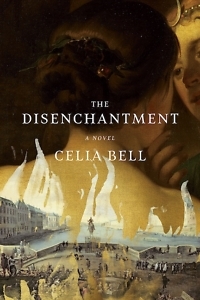Poisonous Dealings
Celia Bell’s debut novel encompasses black magic, murder, and subterfuge in 17th-century France
Baroness Marie Catherine has done her duty as a daughter and a wife, faithfully enduring a stay at a convent as a young woman to learn fealty, then bearing the advances of her foul-breathed husband as he tried to garner a male heir. After numerous miscarriages and several years of tense marriage, Marie Catherine has two children, an almost unbearable hatred for her husband, and a secret. The Disenchantment, Celia Bell’s stunning debut, explores the meaning of love and the risks people will take to keep hold of it.

The novel opens with Marie Catherine and her children, Sophie and Nicolas, posing for a portrait by the hired painter Alain Lavoie. Told in a limited third person point of view, Bell allows the reader to jump from the mind of Lavoie, where we are given an objective first impression of Marie Catherine and her children, into the mind of Marie Catherine herself. The opening scene, while slow-paced, grants a three-dimensional introduction to the cast. Bell lets readers establish their own perception of Marie Catherine and her life — both the carefully curated life she shows to others, such as the painter Lavoie, and the secret life she keeps hidden behind the delicate mask of her face.
As Lavoie paints the family, sans the baron, Marie Catherine tells a story about a stone woman and a massive ogre to keep her children entertained. As Marie Catherine talks, Lavoie is able to observe her with his keen painter’s eye:
She held herself almost supernaturally still as she spoke. At the beginning of the sitting, Lavoie had assumed that her composure was the result of dullness or lethargy, but she seemed to be animated by some emotion that she kept in check only through great self-control. Even her expression barely changed, and when she paused for emphasis, only her eyes moved, gliding from the point on the far wall where they’d been fixed to Lavoie himself, as if silently appraising him. The effect was of a woman trapped inside a sculpture, only her living eyes betraying that she was about to step down from her pedestal.
 Although Marie Catherine takes pains to craft a story of herself as a faithful and loving wife, the reader soon learns that she has a secret lover she sees as soon as her husband goes away on business. The lover, however, is not a man but a woman: Victoire Rose de Bourbon, Mademoiselle de Conti, the daughter of a noble family far richer than Marie Catherine’s. Victoire is a cousin of the king, free-spirited, bold, and risk-taking, the opposite of the careful, cultivated, and restrained Marie Catherine. Their furtive relationship sets off an explosion of events that leaves Marie Catherine in an increasingly dire situation.
Although Marie Catherine takes pains to craft a story of herself as a faithful and loving wife, the reader soon learns that she has a secret lover she sees as soon as her husband goes away on business. The lover, however, is not a man but a woman: Victoire Rose de Bourbon, Mademoiselle de Conti, the daughter of a noble family far richer than Marie Catherine’s. Victoire is a cousin of the king, free-spirited, bold, and risk-taking, the opposite of the careful, cultivated, and restrained Marie Catherine. Their furtive relationship sets off an explosion of events that leaves Marie Catherine in an increasingly dire situation.
Set in 17th-century France, the novel’s atmosphere is permeated by black magic, mysticism, and murder. Poisoning one’s enemies has become a swift and accessible means of punishment, yet French law is beginning to catch on, rounding up all the major factions of mystics and magicians, as well as anyone who’s had the lack of foresight to brag about who they managed to successfully poison, and interrogating (and torturing) them in the bowels of the prison of the Grand Châtelet. Lieutenant General of Police, Gabriel de la Reynie, at the behest of the king himself, spearheads the cleanup. La Reynie considers the state of France a personal affront and is on a mission to expel evil from the streets.
Bell’s use of the limited third person point of view grants access into the hearts and minds of a large and unique cast of characters, allowing a glimpse into the insidious minds of players both present at the metaphorical card table and hidden within the shadows. As Marie Catherine navigates the accusation of her infidelity, she finds herself drawn deeper into the darkened game, fearful of shadows and phantom enemies. It is those made of flesh and blood, however, from whom she must protect herself. Bell’s writing displays a mastery of language and artistry parallel to a seasoned professional of the craft, setting the reader loose in the wild, untamed chaos of France in the 1600s.

Abby N. Lewis is an adjunct English instructor at ETSU. She is the author of the poetry collection Reticent, the chapbook This Fluid Journey, and the newly released chapbook Palm Up, Fingers Curled from Plan B Press.


